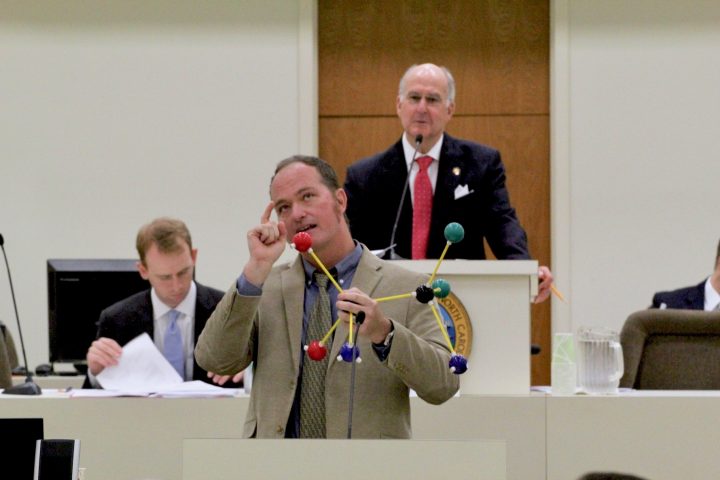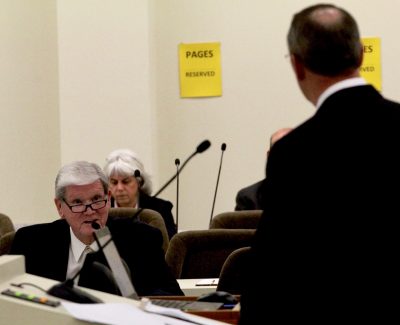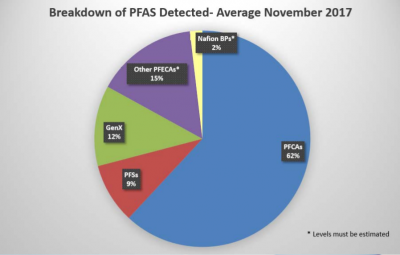
RALEIGH – Last year, the North Carolina General Assembly backed a locally focused strategy in response to revelations about GenX in Wilmington’s water supply.
Last week, several members who supported the plan told researchers from the University of North Carolina Wilmington and officials with the Cape Fear Public Utility Authority they didn’t like what they got.
Supporter Spotlight

At a meeting Thursday in Raleigh of the House Committee on North Carolina River Quality, Rep. Jimmy Dixon, R-Duplin, accused UNCW scientists who worked on GenX studies on oysters, rainwater and river sediments of practicing “political science” to get the most ominous results.
He criticized CFPUA executive director Jim Flechtner for including additional per-fluorinated compounds along with GenX in filtering tests and for the report’s cost estimates of new water system filtration.
“I think your presentation to the committee was biased in making the problem look bigger than it is,” he said.
Dixon suggested that lawsuits were driving the science and said CPFUA did not need a new filtration system since levels of GenX in the water supply have stayed below the 140 parts per trillion health goal since Chemours stopped discharging GenX in wastewater.
“The water’s clean, folks,” Dixon said. “The raw water is safe, it’s below the 140.”
Supporter Spotlight
Rep. Pat McElraft, R-Carteret, also was critical of the reports, saying the findings on oyster mortality were written in a way that would frighten the public. She said tests at extremely high levels of GenX should not have been conducted because levels would not get that high. The public, she said, will focus on the mortality results at those levels.
“To me, it’s a scare tactic,” she said.
Committee members also were concerned the reports had already been made public.
The release of both reports was a requirement under last year’s GenX provision in House Bill 56, which set an April 1, 2018, due date for the reports to be sent to the legislature’s Environmental Review Commission. Both reports, which have been available on the ERC’s website since then, are public records.
On Friday, UNCW and CFPUA each issued statements standing by their work.
“Our scientists have no agenda, political or otherwise, beyond following standard scientific protocols and performing the research requested of them via HB56,” university spokeswoman Janine Iamunno, said in an email response to Coastal Review Online.

Iamunno confirmed that researchers intend to continue the next phases of the oyster and sedimentation studies.
In a tersely worded statement to Coastal Review Online Friday, CFPUA executive director Jim Flechtner said the utility also stands by its report.
“CFPUA presented yesterday at the request of the legislators. The information was shared accurately and correctly. We stand by what we said,” Flechtner said.
He said the utility authority has been clear all along that it would seek to recover its costs if a new filtration system were needed.
“From the onset, CFPUA has stated our position that compounds should be stopped at the source. We believe that our customers should not have to bear the costs associated with removing unregulated chemicals from our drinking water,” he said.
The tense discussion with researchers came as the committee wraps up work ahead of this year’s short session.
Last fall, after the passage of House Bill 56, House and Senate leaders set up committees on river quality in each chamber and to hold hearings and work on GenX and emerging contaminant legislation.
Since then, however, both sides have failed to reach agreement on a new round of proposed legislation that would expand research and testing capabilities. In a special session in February, House and Senate negotiators failed to find a compromise on House Bill 189 because of a funding impasse after the Senate rejected a Department of Environmental Quality funding request backed by the House.
On Thursday, the House River Quality Committee approved a restart of House Bill 189 as part of its report to the House ahead of the General Assembly session, which starts May 16.

River Quality Committee chair Rep. Ted. Davis, R-New Hanover, told committee members that he continues to work with a group of senators on what’s possible in what is expected to be a shorter-than-usual short session.
“I am presently working with members of the Senate on a compromise bill,” Davis said, adding that one thing he is insisting on is consideration of the DEQ funding request.
Davis said that in addition to provisions already under discussion he’s going over other suggestions sent to the committee with his Senate counterparts to see if any of those might be able to be done this year.
Davis said it is doubtful any controversial suggestions will be taken up, but he expects the committee’s work is likely to be extended beyond its Dec. 31 end date and would work on legislation for the 2019 long session as well.
Learn More







